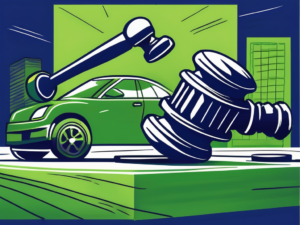Talk to Sales: (401) 200-6026

Being a compliant dealership is crucial in today’s regulatory environment. Not only does it help avoid costly lawsuits, but it also helps maintain a good reputation and build trust with customers. In this article, we will explore the basics of CFPB compliance and provide practical steps to ensure your dealership remains compliant on a daily basis.
Understanding the Basics of CFPB Compliance
Before diving into the steps, it’s important to understand the role of the Consumer Financial Protection Bureau (CFPB) in dealership operations. The CFPB is responsible for enforcing federal consumer financial laws and ensuring consumers are treated fairly in the marketplace.
When it comes to CFPB compliance, dealerships need to be aware of the intricate web of regulations that govern their operations. From the moment a customer walks onto the lot to the final signing of a financing agreement, every step must align with the guidelines set forth by the CFPB. Failure to comply can result in hefty fines and damage to the dealership’s reputation.
The Role of CFPB in Dealership Operations
The CFPB has authority over various aspects of auto financing, including advertising, credit applications, and loan terms. Dealerships must adhere to regulations such as the Equal Credit Opportunity Act (ECOA), Truth in Lending Act (TILA), and Fair Credit Reporting Act (FCRA.
Moreover, the CFPB conducts regular examinations of dealerships to ensure compliance with these regulations. These examinations can be comprehensive, covering everything from the dealership’s advertising practices to the handling of consumer complaints. It is crucial for dealerships to have robust compliance management systems in place to address any issues identified during these examinations promptly.
Key Regulations to Keep in Mind
To be compliant, dealerships must pay attention to key regulations. These include providing accurate and complete information on credit applications, offering fair and non-discriminatory financing options, and properly handling consumer disputes and credit reporting.
Additionally, dealerships must have clear policies and procedures in place to address potential compliance violations. Training staff on these regulations and regularly auditing internal processes can help mitigate the risk of non-compliance. By staying proactive and informed, dealerships can navigate the complex landscape of CFPB regulations with confidence.
Sell cars on the lot faster with AutoRaptor
Know if we’re the right fit within 10 minutes
Steps to Ensure CFPB Compliance
Compliance with Consumer Financial Protection Bureau (CFPB) regulations is crucial for the smooth operation of your dealership and to maintain trust with your customers. Here are some essential steps to follow to ensure CFPB compliance:
Implementing a Compliance Management System
One of the foundational steps in ensuring CFPB compliance is to develop a robust Compliance Management System (CMS). This system should encompass a set of policies, procedures, and controls designed to detect and prevent violations of consumer protection laws. Regular monitoring and updating of the CMS are key to adapting to changes in regulations and the evolving landscape of your dealership’s operations.
Moreover, the CMS should not only focus on mitigating risks and ensuring adherence to regulations but also on fostering a culture of compliance within your dealership. By promoting ethical behavior and accountability at all levels of the organization, you can create a work environment where compliance is ingrained in the company’s values.
Training Staff on Compliance Procedures
Another critical aspect of CFPB compliance is providing comprehensive training to your staff on compliance procedures. It is essential that all employees, particularly those involved in financing and customer interactions, are well-versed in the regulations governing the automotive industry.
Training sessions should cover a range of topics, including the importance of accurate documentation, fair lending practices, and the proper handling of consumer complaints. By investing in continuous education and training for your employees, you not only ensure regulatory compliance but also empower your staff to deliver exceptional customer service while upholding the highest standards of integrity and transparency.
Maintaining Compliance in Daily Operations
Compliance is not a one-time effort; it requires ongoing attention and monitoring. Here are some essential practices to maintain compliance:
Ensuring compliance in daily operations is crucial for the smooth functioning of any organization. It involves adhering to a set of rules, regulations, and standards set by governing bodies to ensure ethical and legal business practices. By maintaining compliance, businesses can build trust with customers, avoid legal issues, and protect their reputation.
Regular Compliance Audits
Conduct regular internal audits to identify any compliance gaps or issues. This will help you address problems proactively and avoid potential violations.
During compliance audits, it is essential to review all aspects of the business operations, including processes, documentation, and employee practices. By conducting thorough audits, organizations can pinpoint areas of improvement and implement corrective actions to enhance compliance measures.
Updating Compliance Policies as Regulations Change
Keep track of regulatory updates and make necessary changes to your compliance policies and procedures. This will help ensure your dealership remains aligned with the latest requirements and reduces the risk of non-compliance.
Regulatory changes are inevitable in any industry, and organizations must stay informed about these updates to remain compliant. By regularly reviewing and updating compliance policies, businesses can adapt to new regulations, train employees on revised procedures, and mitigate the risk of penalties or fines for non-compliance.
Avoiding Lawsuits Through Compliance
Compliance not only reduces the risk of lawsuits but also helps create a culture of trust and transparency. Here are some pro-active measures to prevent legal issues:
Ensuring compliance with regulations goes beyond just avoiding lawsuits; it is about building a foundation of integrity and credibility within your organization. By adhering to industry standards and best practices, you demonstrate a commitment to ethical conduct and customer satisfaction.
The Connection Between Compliance and Lawsuits
Non-compliance with CFPB regulations can lead to consumer complaints, investigations, and ultimately, lawsuits. By maintaining compliance, you can minimize these risks and protect your dealership from costly legal battles.
Moreover, a compliance-focused approach can enhance your reputation in the marketplace. Consumers are more likely to trust businesses that prioritize regulatory compliance, leading to increased customer loyalty and positive word-of-mouth referrals.
Proactive Measures to Prevent Legal Issues
Take proactive steps to avoid legal issues. This includes providing clear and accurate information to consumers, ensuring transparency in financing terms, and promptly addressing any customer complaints or disputes.
Implementing regular training programs for staff on compliance requirements and conducting internal audits can also help identify and rectify any potential issues before they escalate into legal problems. By fostering a culture of compliance and accountability, you can safeguard your dealership’s reputation and financial well-being.
Sell cars on the lot faster with AutoRaptor
Know if we’re the right fit within 10 minutes
The Consequences of Non-Compliance
The consequences of non-compliance can be detrimental to your dealership. It’s essential to understand the potential risks involved:
Financial Penalties and Legal Ramifications
Non-compliance can result in significant financial penalties, which can drain your dealership’s resources. Additionally, lawsuits can damage your reputation and lead to costly legal battles.
Impact on Business Reputation and Customer Trust
Non-compliance can tarnish your dealership’s reputation and erode consumer trust. Negative publicity and customer dissatisfaction can have long-term effects on your business and hinder future growth.
Moreover, non-compliance with regulations can also lead to the suspension or revocation of licenses, further hampering your dealership’s operations. This can result in a loss of credibility in the industry and a decline in customer loyalty.
Operational Disruption and Administrative Burden
Another consequence of non-compliance is the potential for operational disruption and increased administrative burden. Failing to adhere to regulatory requirements may necessitate extensive audits, reporting, and corrective actions, diverting valuable time and resources away from core business activities.
In conclusion, being a CFPB compliant dealership is not only a legal obligation but also a strategic move to protect your business and serve consumers ethically. By understanding the basics of CFPB compliance, implementing a compliance management system, and taking proactive measures, you can minimize the risk of lawsuits and maintain a trustworthy reputation.
Take the Next Step Towards CFPB Compliance with AutoRaptor
Ready to streamline your dealership’s compliance and enhance your sales process? AutoRaptor’s Dealership CRM is designed to keep your team engaged, focused, and accountable, ensuring you stay on top of CFPB regulations effortlessly. Dealerships that switch to AutoRaptor save on average $10.8k per year. Don’t miss out on the opportunity to transform your business operations. Book a quick demo today and discover in just 10 minutes if AutoRaptor is the right fit for your dealership’s unique needs.
Subscribe to our Newsletter
Resources to help your dealership convert more leads into sales, retain more customers, and market inventory smarter, straight to your inbox every Sunday.




